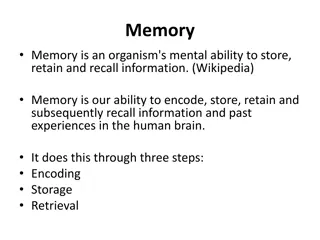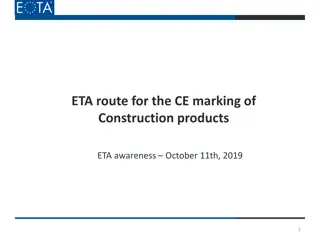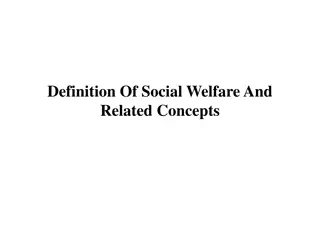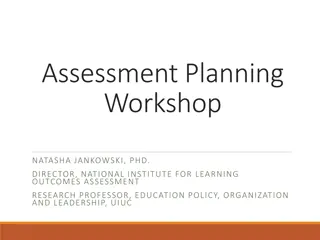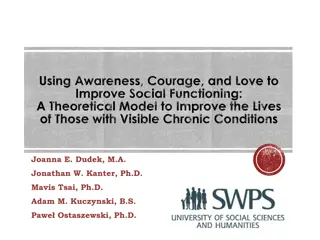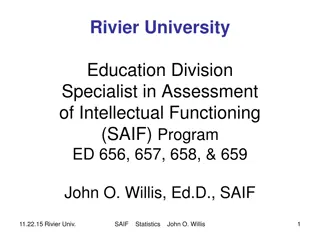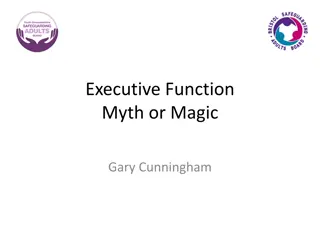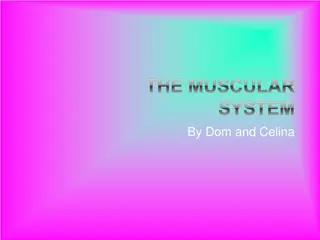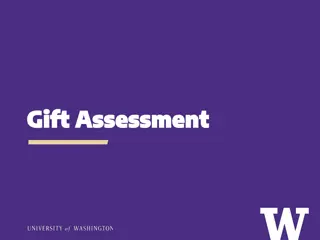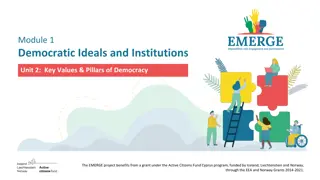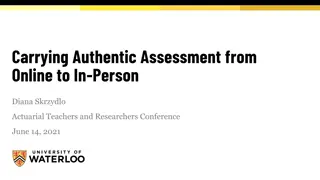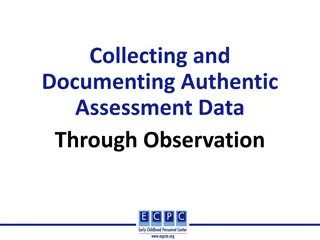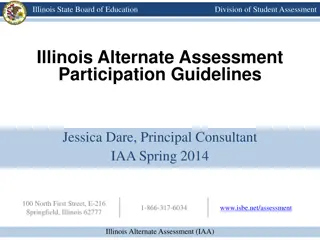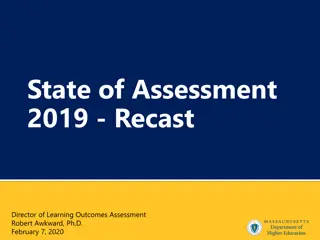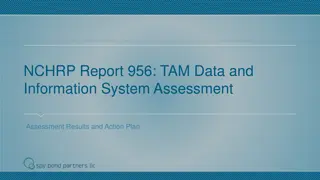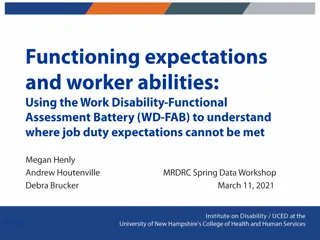Sheffield Early Help Assessment Form Update and Integration with Extended Support Plan
Sheffield has introduced an updated Early Help Assessment form to streamline the assessment process within the Early Help System. This new form combines the Early Help Assessment with the Extended Support Plan, aligning various assessment tools and referral forms into one comprehensive document. The
5 views • 22 slides
Understanding Neuropsychological Assessment: Insights and Applications
Neuropsychological assessment plays a vital role in understanding brain-behavior relationships. This process involves determining cerebral functioning, identifying dysfunction, and assessing cognitive abilities through a combination of interviews, observational data, and testing. The assessment aids
3 views • 33 slides
Enhancing Language Learning Through Peer Assessment
Explore the benefits of peer assessment as a valuable tool for language learning, comparing it with self-assessment. Discover the components and challenges of self-assessment, along with the potential of peer assessment to improve accuracy and promote self-regulation. Gain insights into what peer as
3 views • 29 slides
Introduction to Projective Diagnostic Assessment
Projective diagnostic assessment is a technique used to reveal subconscious psychological states by presenting ambiguous stimuli for individuals to project their thoughts and feelings. This method helps uncover unconscious conflicts and allows for personality assessment through the interpretation of
4 views • 12 slides
Overview of DSW End Point Assessment Team Leader Level 3
DSW End Point Assessment Team Leader Level 3 provides a clear understanding of the assessment process, ensuring individuals comprehend why and when it occurs, responsibilities involved, and how DSW supports them. It covers topics such as what End Point Assessment entails, assessment design and deliv
1 views • 18 slides
Developmental Disability Eligibility Reform Amendment Act of 2022 Overview
The Developmental Disability Eligibility Reform Amendment Act of 2022 introduces new definitions, eligibility criteria, and expands services for individuals with developmental disabilities. It defines intellectual disability, developmental disability, and introduces substantial functional limitation
3 views • 13 slides
Understanding the Basics of Memory Functioning
Memory is the mental ability to store, retain, and recall information through encoding, storage, and retrieval processes. It involves sensory, short-term, and long-term memory stages, with encoding encompassing semantic, acoustic, and visual aspects. The retrieval process involves locating and recov
0 views • 20 slides
Understanding Assessment in Medical Education
Exploring the concepts of assessment in medical education, including defining assessment, types of assessment, reliability, validity, and aligning assessment methods with intended learning outcomes. The importance of constructive alignment and the impact of assessment on learning outcomes are also d
1 views • 12 slides
EOTA and Construction Sector Overview
The European Organisation for Technical Assessment (EOTA) plays a key role in the CE marking of construction products, ensuring compliance with EU regulations. EOTA coordinates Technical Assessment Bodies (TABs) and stakeholders, supports the development of European Assessment Documents (EADs), and
1 views • 26 slides
Assessment Matters in Sociology: Enhancing Learning Through Evaluation
Explore the significance of assessment in sociology education, focusing on key questions to evaluate current assessment procedures, review individual course assessments, and develop strategies to enhance student learning outcomes. Delve into the centrality of assessment in the learning process, with
1 views • 15 slides
Understanding Social Welfare and Related Concepts
Social welfare encompasses a nation's system of programs, benefits, and services designed to address social, economic, educational, and health needs essential for societal well-being. The functional perspective emphasizes individual interdependence and societal efficiency, while the descriptive view
1 views • 9 slides
Cognitive Stimulation Therapy in Post-Acute Care: A Pilot Study
Cognitive Stimulation Therapy (CST) is an evidence-based group intervention designed for individuals with mild to moderate cognitive impairment. It aims to enhance cognitive functioning through various activities such as executive functioning tasks, multi-sensory stimulation, and reminiscence work.
0 views • 9 slides
Insights into Managing Assessment in the Classroom by Assessment Research Group
Explore the importance of standards and assessment in education through the lens of the Assessment Research Group. Gain valuable perspectives on curriculum delivery, understanding the assessment system, learner assumptions, task parameters, and more. Discover how language, structure, and agency play
2 views • 25 slides
Workshop on Assessment Planning by Dr. Natasha Jankowski
Dr. Natasha Jankowski, Director of the National Institute for Learning Outcomes Assessment, conducts a workshop focusing on effective use of assessment data to enhance undergraduate education. The workshop covers areas like evaluating assessment plans, program learning outcomes, and assessment rubri
0 views • 30 slides
Enhancing Understanding through Assessment in Educational Design Workshop
Learn and collaborate on assessment practices in education design at the "Understanding by Design Assessment Focus" workshop. The agenda includes sessions on summative and formative assessment, feedback, reporting, and more. Engage in activities like generating questions, finding destination partner
1 views • 76 slides
Comprehensive Approach to Enhancing Social Functioning in Visible Chronic Conditions
This theoretical model explores the impact of visible chronic differences (VCDs) on individuals, emphasizing stigmatization and societal norms. It discusses the importance of social connection, highlights risks associated with VCDs, and presents the benefits of Functional Analytic Psychotherapy (FAP
0 views • 23 slides
SAIF Program at Rivier University: Assessment of Intellectual Functioning
Rivier University's Education Division offers the Specialist in Assessment of Intellectual Functioning (SAIF) Program led by John O. Willis, Ed.D. The program involves courses ED.656, .657, .658, and .659 focusing on statistics, test scores, measurement, and psychometrics. Resources from experts lik
0 views • 92 slides
Comprehensive Assessment in ACT: A Transdisciplinary Approach
Comprehensive Assessment in Assertive Community Treatment (ACT) involves a transdisciplinary team conducting detailed evaluations to develop unified service plans. Participants are actively engaged in all stages of planning and delivery, with team members and participants collaboratively developing
0 views • 18 slides
Institutional Assessment Planning Workshop Feedback and Insights
Feedback and insights from a recent institutional assessment planning workshop led by Dr. Mark Nicholas at FSU S. Warren Conference Center & Inn. Participants provided feedback on the usefulness of the content, presenter knowledge, ability to develop assessment plans, post-training assessment knowle
1 views • 9 slides
Understanding Voluntary Manslaughter and Diminished Responsibility in Criminal Law
Voluntary manslaughter is a legal concept where certain special defenses can reduce a murder charge to manslaughter, giving judges discretion in sentencing. Diminished responsibility, introduced by the Homicide Act, allows individuals suffering from abnormal mental functioning during a killing to ha
0 views • 23 slides
Understanding Higher Education Assessment: The Complete Guide
Higher education assessment involves a systematic process of collecting, reviewing, and utilizing information to improve student learning and development. This guide covers the assessment cycle, learning outcomes, the mission behind assessment in higher education, what assessment is and is not, reas
1 views • 36 slides
Understanding America Study: Cognitive Functioning Measures
The Understanding America Study (UAS) focuses on developing web-based cognitive functioning measures, including tests for fluid abilities, verbal skills, executive function, and processing speed. Utilizing data from about 9,000 panelists, tests like the Stop and Go Switch task are administered onlin
0 views • 26 slides
Understanding Executive Functioning and Executive Dysfunction
Executive Functioning is a key aspect of cognitive function, encompassing various abilities such as planning, self-awareness, and emotion regulation. Executive Dysfunction, often resulting from frontal lobe injuries, can lead to difficulties in decision-making, social interactions, and learning. Thi
1 views • 21 slides
Understanding the Muscular System: Functions & Importance
Muscles are essential for movement, posture, circulation, and digestion in the human body. Without a properly functioning muscular system, vital processes like breathing and food digestion would be compromised. Maintaining muscle health through exercise and a nutritious diet is crucial to ensure opt
0 views • 11 slides
Understanding Gift Assessment Process at University of Washington
The Gift Assessment Process at University of Washington involves applying a 5% assessment to select current-use gifts over $1,000 and under $5 million. This assessment supports the university's advancement efforts and institutional priorities by transferring 5% of eligible contributions to the Provo
1 views • 5 slides
Overview of Environmental Impact Assessment and Strategic Environmental Assessment Directives
Environmental Impact Assessment (EIA) and Strategic Environmental Assessment (SEA) play crucial roles in evaluating the impact of planned activities on the environment. This content delves into the concept, origins, development, and key elements of environmental assessment, discussing the legal fram
2 views • 35 slides
Institutional Framework and Antitrust Law in the EU
The European Union's institutional framework is defined by the Treaties of Lisbon, European Union, and Functioning of European Union. These treaties establish the EU's objectives, governance principles, and delineate competences. Additionally, EU antitrust law principles are based on the Treaties of
0 views • 16 slides
Understanding Neurodevelopmental Disorders in Childhood and Adolescence
Neurodevelopmental disorders in childhood and adolescence encompass a range of conditions including intellectual disabilities, communication disorders, autism spectrum disorder, and attention deficit/hyperactivity disorder. These disorders impact cognitive development, adaptive functioning, and comm
0 views • 30 slides
Institutional Assessment and Effectiveness Workshop Achievements at SUNY Oneonta
The Office of Institutional Assessment and Effectiveness at SUNY Oneonta has made significant progress in developing assessment protocols and processes, leading to a culture of assessment. This includes completing planning and assessment cycles, establishing objectives and procedures, and aligning u
1 views • 16 slides
Understanding the Principles of a Functioning Democracy
A functioning democracy is built on principles such as the ultimate authority of the people, essential rights like freedom of expression, adherence to human rights, and the government's legitimacy from the electorate. Principles like accountability, freedom of assembly, and the separation of powers
0 views • 20 slides
Oregon Department of Education Assessment and Accountability Resources
Access important information on assessments, accountability, and reporting from the Oregon Department of Education. Find resources on updating assessment records, accessing student scores, and staying informed about assessment requirements for the 2023-24 academic year. Explore links for assessment
0 views • 55 slides
Oregon Department of Education - Assessment Resources and Updates
Explore the Assessment Record Updating Application (ARUA), Accountability Warehouse Extract (AWE), Secure Assessment Reports, and other important tools and information provided by the Oregon Department of Education for assessment data owners, analysts, and partners. Access links for assessment admin
0 views • 54 slides
Enhancing Teaching Assessment for Actuarial Education
Exploring the transition of assessment practices from online to in-person settings, this presentation by Diana Skrzydlo at the Actuarial Teachers and Researchers Conference delves into the purpose of assessment, key principles, and activities for effective evaluation. Discover insights on diagnostic
0 views • 10 slides
Authentic Assessment through Systematic Observation: Best Practices
Explore the process of authentic assessment through systematic observation in early childhood education. Learn about collecting, documenting, and interpreting assessment data using evidence-based practices and technology. Discover the importance of working collaboratively with families and professio
0 views • 53 slides
Overview of Classification of Psychiatric Disorders
Psychiatric disorders are illnesses with various manifestations that impact functioning due to disturbances in biological, social, genetic, and other factors. Two key classification systems, ICD-10 and DSM-5, categorize over 200 types of psychiatric illnesses. The ICD-10 includes categories like org
0 views • 18 slides
Illinois Alternate Assessment Participation Guidelines
The Illinois State Board of Education's Division of Student Assessment provides guidelines for participation in the Illinois Alternate Assessment (IAA). Students with significant cognitive disabilities, typically with intellectual functioning below average and impairments in adaptive functioning, ar
0 views • 9 slides
Assessment Practices in Higher Education Institutions
Dive into the state of assessment for the year 2019, featuring insights on hosting assessment days, establishment of assessment committees, implementation of institutional and program learning outcomes, appointment of a Director of Assessment, compensation for faculty members focusing on assessment,
0 views • 8 slides
NCHRP Report 956 TAM Data and Information System Assessment
This content provides an overview of NCHRP Report 956 focusing on the TAM data and information system assessment results and action plan. It includes details on assessment outcomes, recommendations, implementation action plans, and tools for self-assessment and improvement methodology. The content a
0 views • 21 slides
Symptomatic Control of Functioning Pancreatic NET
Pancreatic neuroendocrine tumors (panNETs) can be classified as functioning or non-functioning, with functioning tumors producing active hormones such as insulin, glucagon, gastrin, or VIP. Symptomatic control is crucial for managing these tumors, with diagnoses based on clinical syndromes and hormo
0 views • 19 slides
Functioning Assessment Tool Results for Job Duties
This content showcases the results of an instrument designed to assess functioning in 8 domains, focusing on specific job duties related to mobility, fine motor skills, self-regulation, communication, and emotions. The data includes categorized scores, employment statistics, and work disability perc
0 views • 8 slides






